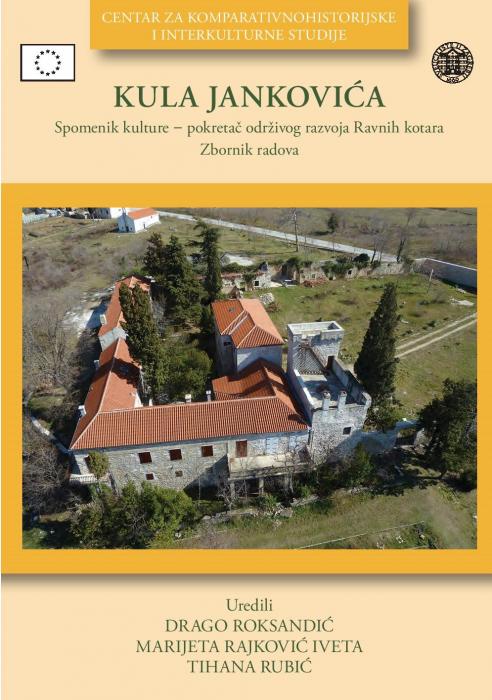Kula Jankovića: spomenik kulture - pokretač održivog razvoja Ravnih kotara: baština, interkulturalizam i revitalizacija: zbornik radova
Synopsis
Tekstovi koje objelodanjujemo u ovom zborniku izvorno su nastali kao produkti sudjelovanja njihovih autora u različitim aktivnostima projekta Kula Jankovića: spomenik kulture, pokretač održivog razvoja Ravnih kotara (Jankovic Castle: historic site, generating sustainable development of the Ravni Kotari region). Riječ je o projektu koji je na temelju aplikacije Sveučilišta u Zagrebu odobrila Europska komisija iz sredstava svojega programa „Preparatory actions for preserving and restoring cultural heritage in conflict areas in the Western Balkans for the year 2010“. Projekt je postao moguć nakon višegodišnjih uspješno realiziranih inicijativa u vezi s obnovom i revitalizacijom Kule Stojana Jankovića u Islamu Grčkom u suradnji s njezinim vlasnicima, potomcima književnika Vladana Desnice, od 2005. do 2011. godine. Ove su inicijative redovito poticale s Filozofskog fakulteta u Zagrebu (Centar za komparativnohistorijske i interkulturne studije, Odsjek za etnologiju i kulturnu antropologiju, Odsjek za informacijske i komunikacijske znanosti itd.), a napose u vezi s Desničnim susretima. Programom društveno-humanističkih i kulturoloških istraživanja, posvećenih književniku Vladanu Desnici, baštiniku Kule...
U završnoj fazi rada na Projektu, u svibnju i početkom lipnja 2014. godine, na području Ravnih kotara održane su tri aktivnosti/radionice koje su rezultirale i objavom ovoga zbornika, a koje su tematizirale pitanja tradicijske kulture, njezine revitalizacije i korištenja u suvremenosti, turističkih i kulturnih resursa i potencijala ovog područja, izazova suprotstavljenih predodžbi o kulturnoj baštini i sl.
(Iz Predgovora)
Chapters
-
Regionalna baština u europskoj perspektiviUmjesto predgovora
-
I. BAŠTINA, REVITALIZACIJA, ODRŽIVI RAZVOJ
-
Život u KuliPredajni (narativni) elementi obiteljskih identifikacija, sjećanja i iskustava vezanih uz Kulu Stojana Jankovića u Islamu Grčkom
-
Obitelj i migracijePrimjeri obiteljskog života u drugoj polovini 20. stoljeća u Kruševu
-
U životu i u smrtiTradicija, konvencija i arhetipovi ljudske egzistencije
-
Obilježavanje mjesta odmaranja s pokojnikom – mirila dalmatinskog zaobalja
-
Kulturna baština obrovačkog kraja
-
Pregled povijesti razvoja grada Benkovca
-
Mogućnosti korištenja tradicijske kulture u ruralnom turizmu i održivom razvoju Ravnih kotara
-
Preduzetnička upotreba kulturnih resursa i mogućnosti primene u održivom ruralnom razvoju
-
O istraživanju tradicionalne narodne kulture, identitetu i međusobnim odnosima kod stanovništva u multikulturnim sredinama krajem 20. i na početku 21. veka
-
II. INTERKULTURNO I TRANSKULTURNO “DEKODIRANJE” I IDENTIFIKACIJA REVITALIZACIJSKIH POTENCIJALA RAVNIH KOTARA
-
Međunarodni sveučilišni centar u Islamu Grčkom i mediteranska akademska zajednicaRazvoj i perspektive
-
Kula Stojana JankovićaIstraživački pristupi i neke determinante u formiranju projektnih koncepata
-
Međunarodni sveučilišni centar u Kuli Stojana Jankovića, Islam GrčkiProšlost, sadašnjost i budućnost obnove i prenamjene sjevernog krila sklopa kule
-
How to use cultural heritage for reconciliation
-
O autorima
-
O Kuli Jankovića u Kuli JankovićaRadionička fotodokumentacija
-
Imensko kazalo
Downloads

